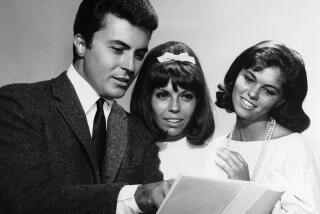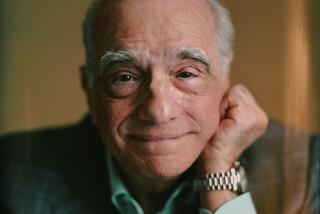Actor John Carradine, Veteran of 500 Films, Stage, TV, Dies at 82
- Share via
John Carradine, whose more than 500 movie appearances over 58 years made him one of the most prolific actors of all time, died Sunday at a hospital in Milan, Italy.
The actor, who was 82, died of natural causes.
Carradine was in Milan as a guest of honor for a showing of one of his movies, United Press International reported. Two of his sons, David and Keith, had flown to Italy on Friday when they were told he was in a hospital.
David Carradine said he was reading his father passages from William Shakespeare, “the author he loved most,” when the sick man “swallowed, turned his head a little while and died.”
Just minutes before, the veteran actor had said: “Milan, what a beautiful place to die,” David Carradine said.
He said his father was stricken Thursday, hours after climbing the 328 steps to the top of the Duomo, Milan’s gothic cathedral.
The tall, gaunt John Carradine boasted of appearing in “10 of the greatest films ever made,” including “Stagecoach,” “The Grapes of Wrath,” “Captains Courageous” and “Blood and Sand.” He played hillbillies, philosophizing old men, preachers and eccentrics. He often appeared in cheap horror movies, playing evil scientists and mad sadists. He portrayed Count Dracula three times. But his greater love was Shakespeare.
Just as eccentric and crusty in life as he was on film, Carradine, according to Hollywood legend, used to recite Shakespeare in his booming voice while walking down Hollywood Boulevard.
But the so-called “Bard of the Boulevard” denied the story.
“I did do it,” however. “In the Hollywood Bowl every night at midnight for five years. Bellowed Shakespeare at 20,000 empty seats.”
He said he did it to improve his elocution and voice projection.
Anecdotes about him abounded. Some of them even are true.
According to Carradine, he never “crashed” the home of John Barrymore, as one story had it. He claimed he accidentally entered the actor’s house through the back door, “dressed in the last of my stock wardrobe: striped morning trousers, spats and homburg.”
Carradine faced Barrymore, who jokingly inquired: “Dr. Livingston, I presume?”
The two classically trained actors ended up drinking into the evening.
Carradine also claimed Katharine Hepburn stopped speaking to him for 20 years after one of his typically crusty remarks. By Carradine’s account, when Hepburn repeatedly said she wanted to play both Mary of Scots and Queen Elizabeth in “Mary of Scotland,” he asked her: “If you played both parts, how would you know which queen to upstage?” Hepburn walked off the stage.
He also rejected a chance to play the Frankenstein character because there was no dialogue. “I never regretted that I turned it down,” he said. Boris Karloff, who was associated with the monster throughout his career, “never ceased to be sorry.”
Even after earning recognition for his many films, Carradine took jabs at movie executives.
“Lately I’m honored all over the country, yet the powers-that-be in Hollywood won’t give me a job,” Carradine said in 1983. “I work all the time on stage, of course. But Lord knows how long it’s been since I’ve had a major movie.”
He was born Richmond Reed Carradine on Feb. 5, 1906, in Greenwich Village, New York, to an attorney-poet-painter father and surgeon mother. At 14, Carradine decided to become an actor after seeing a performance by Robert Bruce Mantell, “then the top Shakespearean actor in the country,” he said.
But he said he was “sidetracked,” and instead became a painter and sculptor after studying at Philadelphia’s Graphic Art School.
Later, he traveled around the South, supporting himself by sketching portraits in the lobbies of office buildings. In 1925, he ended up in New Orleans and made his stage debut in a small production of “Camille” at the St. Charles Theatre.
Carradine next joined a Shakespearean stock company and developed a love of Shakespeare that was to last the rest of his life.
In 1927, he hitchhiked to Hollywood and again supported himself with his sketches. Failing to get film work, Carradine acted in small stage productions. After three years, he landed a screen role in “Tol’able David.”
Carradine appeared in four more films as Richmond Carradine before signing a contract with 20th Century-Fox in 1935, when he changed his name to John.
With a strong sense of independence fueled by his loyalty to the theater, Carradine made little effort to fit in during his early years in Hollywood.
“I was a stage actor and proud of it,” he once said.
He liked to tell of the time an agent told him the part of a brutal prison sergeant in John Ford’s film “Prisoner of Shark Island” would “make me.”
But Ford wanted him to audition for the part, “like a blithering idiot, drooling at the mouth, slack jaw, vacant eyes,” Carradine said.
“I couldn’t see it that way. I tried to play some of the scene the way he wanted it and the rest the way I thought it should be played.”
Afterward, a young actor told him: “You’ve got the part.” But Carradine did not believe him. The actor insisted. And after Carradine found that the actor was Francis Ford, the director’s brother, even Carradine had to agree.
Carradine went on to act in such other John Ford movies as “The Hurricane,” “Four Men and a Prayer,” “Drums Along the Mohawk” and “The Man Who Shot Liberty Valance.”
In 1943, Carradine founded and directed his own Shakespearean repertory company, playing Hamlet, Iago and Othello. However, it was difficult for the company to travel cross-country in wartime and the company folded.
“I think I’ve been unlucky. I’ve missed out on everything,” Carradine once lamented. “I wanted to be the pre-eminent Shakespearean actor of my day and I wasn’t. It took me years to get to Broadway, then I never played Shakespeare there.”
But Carradine went on to star in a number of pictures, often in cheap horror films such as “Munster Go Home,” “Billy the Kid Vs. Dracula” and “The Astro Zombies.”
Times critic Linda Gross praised his performance in the 1983 movie “Klynham Summer,” a New Zealand ghost story about murders in a small village. “Carradine is larger than life, and when he is on screen, he dominates. The evilness of his character and the ugliness of his deeds are out of joint with this otherwise quaint period piece,” Gross said.
Carradine married four times and had five sons. Three of them, David, Keith and Robert, became television and film actors.
Keith Carradine once told an interviewer that his father didn’t like to discuss his horror films. He said his father often accepted parts because he needed the money and at one time said to him: “Just make sure that if you’ve got to do a role you don’t like, it makes you a lot of money.”
Carradine claimed to have appeared in more than 160 plays in the United States and abroad, including “The Time of Your Life,” “On Golden Pond,” “A Funny Thing Happened on the Way to the Forum” and some 25 stagings of “Tobacco Road” with Carradine in the familiar role of Jeeter Lester.
In the 1950s, Carradine found work in television, regularly appearing in “Lights Out,” “Climax,” “Bat Masterson,” “Thriller” and “The Red Skelton Show.”
In the 1960s, ‘70s and ‘80s, he made even more films, including “House of Long Shadows” and Woody Allen’s “Everything You Always Wanted to Know About Sex but Were Afraid to Ask.”
Carradine’s dry humor often poked fun at his own predicaments. Unemployed at one point in 1981 and invited to a brunch in his honor, Carradine commented on arriving: “I came in from Santa Barbara today because, like so many of us, I’m an out-of-work actor looking for a free meal.”
More to Read
Only good movies
Get the Indie Focus newsletter, Mark Olsen's weekly guide to the world of cinema.
You may occasionally receive promotional content from the Los Angeles Times.






